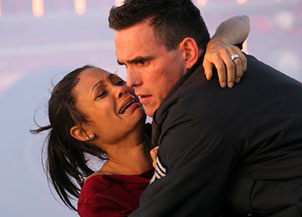A-List: Race in America
By Sean Collier
December 18, 2008
Do the Right Thing
Another obvious choice, Spike Lee's masterpiece still resonates nearly 20 years later. Far from a bleak grittiness for most of its running time, Do the Right Thing sets up a romanticized version of Bedford-Stuyvesant, and then tears it apart. The plot of Do the Right Thing, however, is not the source of the film's strength; the ambiguity in many of the moral issues the film presents is the true gold here. In defiance to the title and the exhortation to "always do the right thing," when the climactic riot breaks out, Mookie finds that there might not be a right thing left to do.
Night of the Living Dead
This is obviously a stretch, but you may have noticed that I have a thing for horror. There have been any number of readings of the social implications in George Romero's seminal zombie film, but many focus on the fact that the film's hero, Ben (Duane Jones,) is shot without question at the end of the film. Released in the wake of the assassination of Martin Luther King Jr., one possible interpretation of this climax posits that Romero was trying to point out that white Americans inevitably lump African-Americans as the "other," whether that "other" is communists, criminals, or, in the case of this film, monsters. Other interpretations see the film as a metaphor for the brewing tension of desegregation, or a commentary on the Vietnam War; still others like to claim that Night of the Living Dead is nothing more than a scare flick. Judge for yourself.
Hairspray (1988)
See? Zombies and John Waters. The original (non-musical) version of Hairspray is a classic story of the outsiders taking on the elite, with an unlikely group of protesters trying to desegregate the dance halls and television broadcasts of Baltimore. Every performance in Waters' film is perfect, and there's a serious message mixed in to the madness: racial issues are often more about the haves putting down the have-nots than simple black and white. Mostly, though, I'm including Hairspray as a reminder that these issues can be dealt with cinematically without doom and gloom.
Mississippi Burning
There are countless films about the civil rights struggle, but this is one of the best. Carried by undeniable performances from Gene Hackman, Frances McDormand, Willem Dafoe, Brad Dourif and R. Lee Ermey, the film starts at a fever pitch of violence and tension and doesn't relent until the final frame. Controversial for its semi-verifiable depiction of the true events depicted, Mississippi Burning drew fire for putting two white heroes in the lead. The film isn't about the FBI agents, though � it's simply about how volatile and unapproachable the south was during the civil rights movement.
Far From Heaven
Todd Haynes' film is one of my favorites mainly because every frame is gorgeously shot, but there's much more to the film than perfect cinematography. Julianne Moore is perfect in portraying how social ostracism resonates beyond the individual and into the lives of their loved ones, and the private unraveling of Dennis Quaid's gay businessman is a powerful counterpoint to the public hatred directed at Dennis Haysbert's mild-mannered gardener.
One to Watch For
It's a little out of the range of the rest of this column, but I was really grabbed by the trailer for Spike Lee's upcoming Miracle at St. Anna. Lee's first film since the serviceable Inside Man, the film follows a mysterious shooting and a bizarre Italian artifact back into World War II and the only segregated combat unit of the war. A strong cast that includes Derek Luke, Michael Ealy, Joseph Gordon-Levitt and James Gandolfini should make this more than worth a look, though it might get a somewhat limited release.
Continued:
1
2
|
|
|
|




